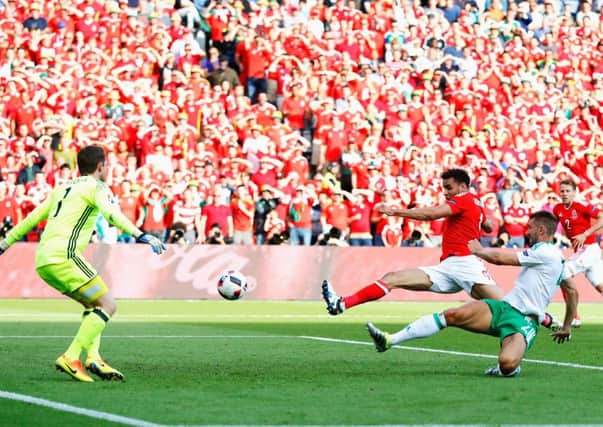Wales 1-0 N Ireland: Welsh joy in a tale of two Gareths


Northern Ireland, meanwhile, head back to Belfast via their base in Lyon having made a lot of friends during a longer than expected stay in France.
It was a Gareth whose goal decided the tie, just not the one expected. But the more celebrated Gareth played a significant part in the winner. It only requires a hint of an opportunity for the Real Madrid player to leave his mark of quality on a game.
Advertisement
Hide AdAdvertisement
Hide AdBale’s dangerous cross from the left was turned into his own net by McAuley, whose anguish is eased by knowing that his intervention was probably necessary. Wales substitute Hal Robson-Kanu was lurking behind and was surely expected to turn the ball in. But it was McAuley whose misfortune it was to apply the final touch.
Northern Ireland were unable to conjure up inspiration to complement their perspiration. They restricted Wales, and Bale in particular, for long spells but could not fashion the clear chance required to at least level the score and take the tie to extra-time.
The longer the game wore on, the more likely it seemed Wales would emerge victorious in a so-called “British derby”. The match more than lived up to this possibly unpromising billing.
It was a pleasing green and red colourscape inside the stadium. Wales and Northern Ireland fans mingled together, with only some areas segregated.
Parc des Princes will rarely have seen anything like it. The singing from both ends carried on throughout a tense battle that was the antidote to Parisian sophistication. The occasion was certainly unique in one respect at least – the first all-UK knockout match at a major finals.
Some might contend they do not wish to see another. But while locals must have winced at the length of time the ball remained in the air, Michael O’Neill, the Northern Ireland manager, wore the satisfied look of a manager who knew his plan to frustrate Wales was being carried out to the letter.
On the pitch it was a quietly fascinating duel between sides with different styles and objectives. Northern Ireland’s aim was to keep things as tight as possible for as long as possible, although they were not completely lacking in ambition.
Jamie Ward joined Kyle Lafferty in what was, ostensibly, a two-man front line although the former was quick to drop back when required. But it was at the back where Northern Ireland impressed again, their three centre-halves augmented by wing-backs in Stuart Dallas and 36-year-old Aaron Hughes.
Advertisement
Hide AdAdvertisement
Hide AdBale was reduced to dropping deep and hitting long balls that in his mind might have been dropping on to the foot of a Real Madrid team-mate. But here they were not. Neil Taylor, playing on the left for Wales, seemed struck by a prolonged bout of nerves and was slicing or failing to trap nearly everything that came his way.
Wales did not have a shot on target in the first half. It was a very different Parc des Princes experience for Michael McGovern, who played such a pivotal role against Germany in this same stadium four days earlier.
Here the Northern Ireland goalkeeper stood and watched for long spells. The fact Bale had to wait until the 56th minute for his first chance to take a free-kick within hitting distance of the goal summed up Northern Ireland’s disciplined approach. Bale’s effort was a decent enough strike but the confident McGovern leapt to his left to save.
Northern Ireland made Wayne Hennessey at least work in the opening half; Dallas brought out a flying save early on while the keeper tipped over a shot from Ward and a header from Lafferty. But O’Neill’s side wilted in the second half as class eventually told. Sam Vokes should have put Wales ahead earlier with a free header early in the second half.
Bale received a pass from Aaron Ramsey and whipped in a cross that was laced with threat. McAuley, whose header against Ukraine was one of Northern Ireland’s two goals in France, stretched out a leg and directed the ball past McGovern.
There was still time for Northern Ireland to respond. But Wales defended stoutly when their opponents glimpsed opportunities having earned a couple of set-pieces.